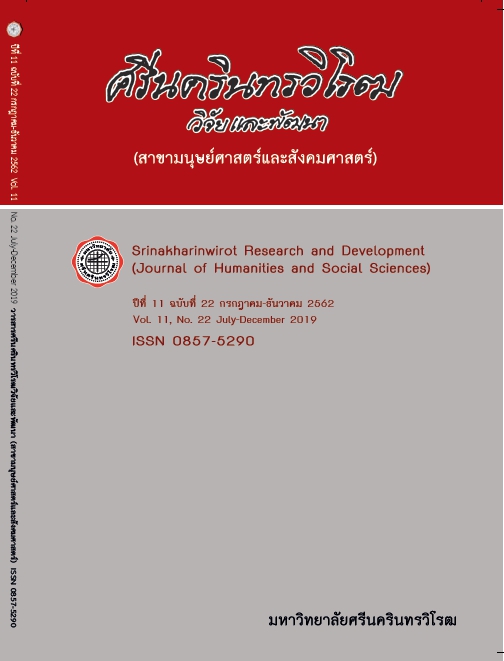ความสัมพันธ์ระหว่างอัตลักษณ์ทางเฟมินิสต์เชิงบวกและการถูกกระทำรุนแรงในคู่รัก: อิทธิพลส่งผ่านของการเห็นคุณค่าในตนเองและอำนาจในความสัมพันธ์(THE RELATIONSHIP BETWEEN POSITIVE FEMINIST IDENTITY AND INTIMATE PARTNER VIOLENCE VICTIMIZATION: THE MEDIATING EFFECT)
Keywords:
Positive Feminist Identity, Intimate Partner Violence VictimizationAbstract
This research examined the effect of positive feminist identity on intimate partner violence victimization through the mediating role of self-esteem and relationship power. A sample of 311 heterosexual working women, aged 30-60, and living in Bangkok completed the questionnaires measuring self-esteem, relationship power, positive feminist identity, and intimate partner violence victimization.
The structural equation modeling analysis revealed that the model fitted the empirical data. The model indicated that the chi-square/df = 1.54, RMSEA = .040, CFI = .99, TLI = .99 and SRMR = .021. Positive feminist identity affected intimate partner violence victimization directly and indirectly through self-esteem and relationship power (p < .01).
Downloads
References
[2] กรมกิจการสตรีและสถาบันครอบครัว (2558). รายงานข้อมูลสถานการณ์ด้านความรุนแรงในครอบครัวฯ. สืบค้นจาก https://www.naewna.com/lady/columnist/28515
[3] Ali, P.A., and Naylor, P.B. (2013). Intimate partner violence: A narrative review of the feminist, social and ecological explanations for its causation. Aggression and Violent Behavior. 19: 611-619.
[4] Filson, J., Ulloa, E., Runfola, C., and Hokoda, A. (2010). Does Powerlessness Explain the Relationship Between Intimate Partner Violence and Depression?. Journal of Interpersonal Violence. 25(3), 400-415.
[5] Downing, N.E., & Roush, K.L. (1985). From passive acceptance to active commitment: A model of feminist identity development for women. The Counseling Psychologist. 13(4), 695-709.
[6] Kucharska, J. (2015). Feminist Identity Styles, Sexual and Non-Sexual Traumatic Events, and Psychological Well-Being in a Sample of Polish Women. Journal of Interpersonal Violence. 1-20.
[7] Saunders, K.J., and Kashubeck-West, S. (2006). The relations among feminist identity Development, gender-role orientation, and psychological well-being in women. Psychology of Women Quarterly. 30, 199-211.
[8] Citarella, A.I., and Mueller, J.A. (2015). The Correlation between Feminist Identity Development and Psychological Maltreatment in Intimate Relationships among College Students. Journal of Student Affairs Research and Practice. 52(3), 327-340.
[9] Boisnier, A.D. (2003). Race andWomen’s Identity Development: Distinguishing Between Feminism and Womanism Among Black and White Women. Sex Roles. 49: 211-218.
[10] Papadakaki, M., Tzamalouka, G.S., Chatzifotiou, S., and Chliaoutakis, J. (2009). Seeking for Risk Factors of Intimate Partner Violence (IPV) in a Greek National Sample: The Role of Self-Esteem. Journal of Interpersonal Violence. 24(5), 723-750.
[11] Eagly, A.H., Eaton, A., Rose, S.M., Riger, S., and McHugh, M.C. (2012). Feminism and Psychology: Analysis of a Half-Century of Research on Women and Gender. American Psychologist. 67: 211-230.
[12] Straus, M.A., Hamby, S.L., Boney-Mccoy, S., and Sugarman, D.B. (1996). The revised Conflict
Tactics Scales (CTS2): Development and preliminary psychometric data. Journal of Family Issues. 17: 283-316.
[13] Cast, A.D., and Burke, P.J. (2002). A Theory of Self-Esteem. Social Forces. 80(3), 1041-1068.
[14] Farrell, A.K., Simpson, J.A.; and Rothman, A.J. (2015). The Relationship Power Inventory: Development and validation. Personal Relationships. 22(3), 387–413.
[15] Eisele, H., & Stake, J. (2008). The differential relationship of feminist attitudes and feminist identity to self-efficacy. Psychology of Women Quarterly. 32, 233-244.
[16] Jezl, D.R., Molidor, C.E., and Wright, T.L. (1996). Physical, Sexual and Psychological Abuse in High School Dating Relationships: Prevalence Rates and Self-Esteem Issues. Child and Adolescent Social Work Journal. 13(1), 69-87.
[17] Backus, F.R., and Mahalik, J.R. (2011). The Masculinity of Mr. Right: Feminist Identity and Heterosexual Women’s Ideal Romantic Partners. Psychology of Women Quarterly. 35(2), 318-326.
[18] Dunkle, K.L., Jewkes, R.K., Brown, H.C., Gray, G.E., McIntryre, J.A., & Harlow, S. D. (2004). Gender-based violence, relationship power, and risk of HIV infection in women attending antenatal clinics in South Africa. Lancet. 363, 1415-1421.
[19] Hair, J.F., Black, W.C., Babin, B.J.; and Anderson, R.E. (2010). Multivariate data analysis: A global perspective. NJ: Pearson Prentice Hall.
[20] Sriyothin, S.; and Maneesri, K. (2017). The Mediating Effect of Adult Attachment on the Relation between Childhood Experiences and Intimate Partner Perpetration and Victimization in Thailand. Asian Social Science. 13(2), 75-87.
[21] Fischer, A.R., Tokar, D.M., Mergl, M.M., Good, G.E., Hill, M.S.; and BIum, S.A. (2000). Assessing women’s feminist Identity development: Studies of convergent, discriminant, and structural validity. Psychology of Women Quarterly. 24, 15-29.
[22] Maneesri, K. (2017). The Mediating Effect of Self-Esteem on the Association between Big Five Personality Traits and Life Satisfaction. Journal of Research Methodology. 30(1), 1-14.
[23] Rosenberg, M. (1965). Society and the adolescent self-image. Princeton, NJ: Princeton. University Press.
[24] Weitz, R. (1982). Feminist Consciousness Raising, Self-Concept, and Depression. Sex Roles. 8: 231-241.
Downloads
Published
How to Cite
Issue
Section
License
Srinakharinwirot Research and Development Journal of Humanities and Social Sciences is licensed Under a Creative Commons Attribution-NonCommercial-NoDerivs 4.0 International (CC-BY-NC-ND 4.0) License, Unless Otherwise Stated. Please Read Journal Policies Page for More Information on Open Access, Copyright and Permissions.



